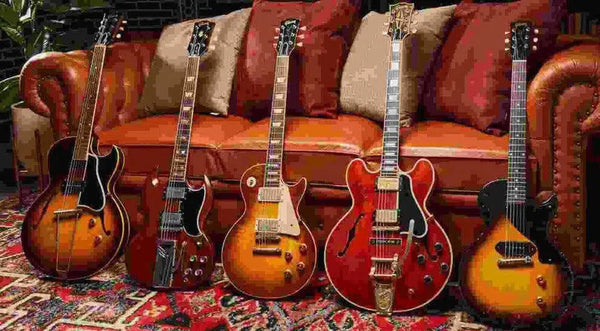Choosing the perfect guitar for you

Choosing the right guitar can be an overwhelming task, especially for beginners. With so many options available, it's important to consider your personal preferences, playing style, and budget. we will try to guide you through the process of picking the perfect guitar for you.
What is your playing style?
The first step in choosing a guitar is to determine your playing style. Are you interested in playing acoustic or electric? Each type of guitar has its own unique sound and characteristics. Acoustic guitars are great for folk, country, and singer-songwriter styles, while electric guitars are more commonly used in rock, metal, blues, and jazz genres.
What is your skill level?
Consider your skill level when choosing a guitar. If you're a beginner, it's best to start with a guitar that is comfortable to play and easy to handle. If you're small then Look for guitars with a smaller body size and a shorter scale length. These features will make it easier for you to learn the basics and build your skills.
What is your budget?
Set a budget for your guitar purchase. Guitars come in a wide range of prices, so it's important to determine how much you're willing to spend. Keep in mind that higher-priced guitars often offer better quality and sound, but there are also great options available at lower price points.
Try before you buy
Before making a final decision, it's crucial to try out different guitars. Visit a guitar shop and play a variety of guitars to see which one feels and sounds the best to you. Pay attention to the comfort of the neck, the action (the distance between the strings and the fretboard), and the overall sound quality. Don't be afraid to ask for assistance from the store staff—they can provide valuable insights and recommendations.
Consider the guitar's construction and materials
When choosing a guitar, pay attention to its construction and materials. With Acoustic guitars, solid wood generally offer better sound quality and resonance compared to laminated wood guitars but not always the case, if you do find a laminate guitar which you like the sound of it's likely to sound that way for a long time. The type of wood used for the top, back, and sides of the guitar can also affect its tone. Common tonewoods include spruce, cedar, mahogany, and rosewood..solid top guitars generally sound nicer the more they're played and the wood opens up
Additional features and accessories
Lastly, consider any additional features or accessories you may need. For example, if you're interested in playing acoustic guitar, you may want to invest in a built-in pickup system for amplification. Electric guitar players may need to purchase an amplifier, cables, and effects pedals. These additional items should be factored into your budget.
Remember, choosing a guitar is a personal decision. Take your time, do your research and don't always rely on other peoples reviews (it's possible that some influencers are paid to give glowing testimonies on guitars they have no experience of), trust your instincts. With the right guitar in your hands, you'll be on your way to creating beautiful music.

: invalid url input -->)